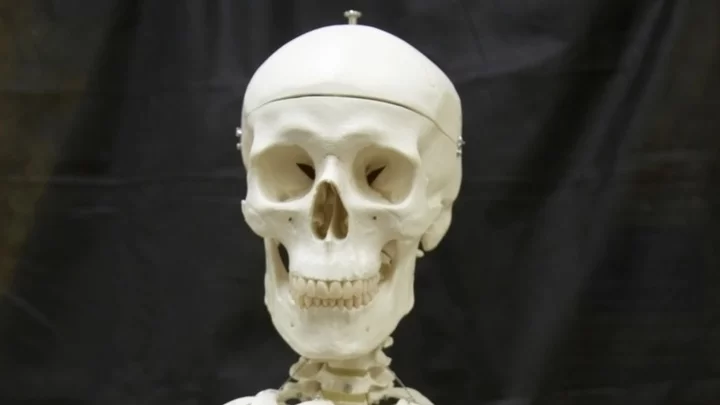
Biden presses student debt relief as payments resume after the coronavirus pandemic pause
President Joe Biden has announced another $9 billion in federal student loan debt forgiveness
2023-10-04 19:46

More than a quarter of middle-aged women living with ‘metabolically healthy obesity’ – study
Almost one in 10 middle-aged men and more than a quarter of middle-aged women in the UK are “fit but fat”, researchers have said, as they called for more to be done to help people reduce their weight. Academics said that there are large regional differences over levels of “metabolically healthy obesity”, which could be down to different diets or other lifestyle factors as well as ethnic and genetic differences. People who are “fit but fat” are considered to be obese by their body mass index (BMI) score but have none of the complications associated with obesity including abnormal blood sugar levels; high cholesterol; high blood pressures; type 2 diabetes or other signs of heart disease. The UK has similar levels seen in Sweden, Norway and Germany, experts said. The highest proportion of metabolically healthy obesity is observed in France and other Mediterranean countries such as Italy and Israel, experts told the the Annual Meeting of the European Association for the Study of Diabetes. There will always be people living with obesity who seem to be protected against obesity-related cardiometabolic diseases Prof Mattias Bluher One study shows that 8% of men and 27% of women in the UK aged between 40 and 50 are living with “metabolically healthy obesity”. Asked how many people in the UK are affected, Professor Matthias Bluher, of the University of Leipzig and Helmholtz Centre Munich in Germany, said: “The (UK) is very similar to situation Sweden, Norway and Germany. “There are populations in Micronesia or Asian populations where it is down to 2-5% only. “Some populations may be, despite large amounts of adipose tissue, better protected against comorbidities and Caucasian populations belong to those.” Prof Bluher said that healthy obesity is seen in a number of premenopausal women. It comes as Prof Bluher called for better weight management programmes for people who fit the profile. He pointed to previous work which suggests people who are “healthy obese” have a higher risk of coronary heart disease, cerebrovascular disease and heart failure compared to their in a normal weight range. “There will always be people living with obesity who seem to be protected against obesity-related cardiometabolic diseases,” he told the conference. “The concept that metabolically healthy obesity affected people may not benefit from weight loss strategies has been challenged by recent data. “A timely and personalised treatment of obesity should also be recommended to people living with healthier obesity.” Read More Charity boss speaks out over ‘traumatic’ encounter with royal aide Ukraine war’s heaviest fight rages in east - follow live Jonnie Peacock on Strictly Come Dancing representation: ‘It’s important to break people’s perceptions’ What you need to know about depression during menopause – as Carol Vorderman opens up Autumn pests to look out for and how to get rid of them in your home and garden
2023-10-04 16:50

Jonnie Peacock on Strictly Come Dancing representation: ‘It’s important to break people’s perceptions’
BBC One’s Strictly Come Dancing has been “fantastic” for disability representation, says Jonnie Peacock MBE – the show’s first amputee contestant. The sprinter and paralympian, who was partnered with professional dancer Oti Mabuse in 2017, helped pave the way for celebrities with disabilities, including presenters Rose Ayling-Ellis and JJ Chalmers. The new 2023 series sees cyclist and swimmer Jody Cundy – who, like Peacock, had his right leg amputated just below the knee – compete with Jowita PrzystaÅ‚, who lifted the glitterball trophy last year with Hamza Yassin. “For me, going on Strictly was important to attempt to break people’s perceptions and make them realise the reason that I would be a bad dancer would absolutely not be my leg,” says the 30-year-old. “My leg is actually one of my strong suits! “Rhythm,” he laughs, “That was more the problem.” Peacock – who became a household name after smashing the world record and claiming gold in the 100m T44 final at London 2012 Paralympic Games – said by appearing on the popular dancing show, he was “trying to get people to understand that we look at someone and we instantly judge what they’re able to do, and put them in a box”. The World Health Organisation estimates that 16% of the world’s population is disabled. “But when you look at your TV – especially 20 years ago – it [looked like] 0.1%, and the same with race and gender,” notes Peacock. “Now people are starting to realise that we want our world to be reality, and we want our [TV] world to encompass what it actually looks like. “It’s not just Strictly, pretty much all of the reality TV shows have disabled contestants in [now]. It’s so important. It’s a way to show that we are an individual, and that we have something to give.” Peacock was recently made an ASICS ambassador (“It’s really cool to be working with a brand who actually care about a lot of the things I care about – that it’s so much more than sport,” he says). And after a difficult summer on the track, he’s looking ahead to the indoor winter para season and the Paris Paralympics next summer. “I felt the worst I’ve felt in years, as soon as I got past 50 or 60 metres [during Paris Para Athletics World Championships in July],” says the sprinter, who later discovered he had hamstring tendinopathy. “I’d kind of lost the love of the event. Even though I love training, I didn’t enjoy competing too much. Even though I love doing it, it was bringing me a lot of misery.” As well as injury niggles, he’s been having issues with the alignment of his prosthetic blade. For para athletes, this technical side of the sport adds additional complication. “I used to love that, but there was a couple of years where I just felt off balance and didn’t realise why,” he says. “We had to play with so many different settings… that was the moment where I was constantly [thinking], ‘I wish I had a foot there where it should be, I wish I didn’t have to worry about setting this up and could just go for it’.” Peacock was five when he almost died from meningitis and his right leg had to be amputated – a time he has few memories of (“I have one flashback in the back of the car being rushed to hospital, with my Power Rangers duvet wrapped around me”). Growing up, he had several bone revision surgeries – “because once you’ve had an amputation, the bone will carry on growing,” explains Peacock. Now though, he’s showing no signs of slowing down, even though sprinter careers are notoriously short. For the next Paralympics, “It’s gold or nothing – Felix [Streng of Germany] has got it now [after Tokyo 2020], but my plan is to hopefully make him the shortest Paraylmpian champion ever.” After being so dominant in the 100m for so long (he’s a two-time Paralympic gold medalist, two-time world champion, and two-time European Championship gold medalist), what keeps him motivated to win? “It’s probably greed,” he laughs, “It’s just never enough, you just want more, it’s an addictive feeling. It’s like you’re just constantly chasing to try be a better athlete – a better version of you.” And with age has come a better understanding of how his own happiness and mental health is tied to his physical health. “I don’t exercise for a period of time, I can get a little bit almost, not depressed, but edging on that, just not happy, very lethargic,” he reveals. Youth comes with a blissful naivety about health, he says. Before, “I never really realised that every time I exercised, I felt better afterwards. Now [my body] is more sensitive. I don’t feel fantastic 24/7, creaks and aches start to appear, grogginess, fatigue…” These days, when he’s not feeling his best, he’ll start a day with a 15-minute indoor bike session at home, where he lives with para athlete girlfriend Sally Brown. “I hate it, I literally hate it!” he laughs. “I want to sit on the sofa and watch TV [instead]. I feel atrocious for 10 minutes afterwards, but then I bounce up so high for the rest of the day, I’m so happy. “The closest thing that affects my mental health is my [physical] health. If I eat like crap, if I sleep like crap, if I don’t exercise, I will be in a bad mental health space. If I exercise, even just a little bit, if I eat well, if I sleep well, I don’t feel like that. It’s understanding there’s a cause and effect relationship to a lot of things.” He swears by the feel-good endorphins of a freezing cold shower everyday. “My friend told me about Wim Hof [the Dutch endurance athlete known as The Iceman] six or seven years ago. I hate hot showers now, to the point where I was in a hotel once and had to get the engineer to come up because the shower didn’t go cold [enough].” Peacock says he tries to remember that “life is a game” and “a gift”. He continues: “We waste it because we take it too seriously. And we’ve been forced to take it too seriously by the outside world – we’ve been given pressures, we’ve been given expectation, and you end up allowing the stress to enclose you and take you away from that childhood mentality of just going out and having fun. “When you’re dead, you’re not going to be sitting there going, ‘Oh, I wish I’d kept my boss a bit happier’.” Jonnie Peacock is sponsored by ASICS. To find out more visit asics.com. Read More Charity boss speaks out over ‘traumatic’ encounter with royal aide Ukraine war’s heaviest fight rages in east - follow live What you need to know about depression during menopause – as Carol Vorderman opens up Autumn pests to look out for and how to get rid of them in your home and garden How can I tell if my child has ADHD?
2023-10-04 15:26

How to get rid of bed bugs? The signs and symptoms as infestation could make its way from Paris to London
It was a not-so glamourous end to Paris Fashion Week, as a “widespread” outbreak of bed bugs caused panic and disgust in the French capital. Paris authorities sent out a public warning that “no-one is safe”, with the small insects making their way through the city. In recent weeks and months, there have been numerous sightings on public transport and other locations. “No one is safe. You can catch them anywhere and bring them home, and not detect them in time until they have multiplied and spread,” deputy mayor Emmanuel Grégoire, told French TV. Videos posted on social media show insects crawling over seats on the Paris Metro as well as appearing in huge numbers on cinema seats. Some users have also shared their experiences of being bitten by the critters. So, how can you help protect yourself against a bedbug infestation? Here’s everything you need to know. How do you know if you have bed bugs? To find out if you have bed bugs, it’s best to keep an eye out for two things: 1. Bites on your body – these look like little red marks that cause itchy welts. “These welts usually appear in a zigzag pattern,” the American Academy of Dermatology Association says. 2. You should always keep an eye out for signs of bedbugs, this includes odour, specks of blood on bedding, exoskeletons, tiny blackish specks and eggs. • Odour: If you notice a sweet or musty smell in your sleeping area, there might be a heavy infestation in the room, the AADA says. • Specks of blood: Look at your bedding, mattress and furniture – if you notice specks of blood anywhere, the insects might have made their way into your home. • Exoskeletons: The small insects have an outer shell that they shed and leave behind. Check for remains on your bedding, mattress and cushions. • Tiny blackish specks: The blackish specks are a sign of beg bug excrement. • Eggs: “After mating, female bed bugs lay white, oval eggs in cracks and crevices,” the AADA says on its website. These will be in the size of an apple seed, so keep your eyes peeled. How do I treat bedbug bites? The NHS says bedbug bites usually clear up on their own in a week or so but there are a few steps you can take to help you during your recovery process: • Put something cool, like a clean, damp cloth on the affected area to help with the itching and to ease off any swelling. • Be sure to keep the affected area clean to prevent any further infection. • Try your best not to scratch the affected area. You can also get steroid creams like hydrocortisone cream to ease bedbug bites. However, children under 10 and women who are pregnant should get advice from a doctor before using this cream. Another option would be to use antihistamines, these may help if the bites are very itchy and you’re unable to sleep, the NHS says. How to get rid of bed bugs – the do’s and don’ts It can be hard to get rid of the small insects on your own, so you might need to contact your local council or pest control service to get rid of the pesky creatures. Here are some steps you can take to reduce bed bugs: • Remove the affected bedding and clothing – wash on a hot wash of 60c and tumble try on a hot setting for at least 30 minutes. • You can also put the infested bedding and clothing in a plastic bag and place It in your freezer for 3 to 4 days. • It’s time to up your cleaning game – “bedbugs are found in both clean and dirty places, but regular cleaning will help you spot them early,” the NHS adds. Here’s what you should avoid doing: • Do not keep clutter around your bed, try to keep your space as clean as possible. • Do not bring second-hand furniture indoors unless you have cleaned and carefully checked it. • Do not take luggage or clothing indoors without checking it properly – especially if you have come from somewhere where you know there are bedbugs. What are the causes of bedbugs and where do they live? The wingless parasitic insects are found all around the world and may be linked to, more frequent travel, changes in pest control practices and insecticide resistance. Bedbugs can be found in: • Clothing • Luggage • Bedding • Boxes • Box springs • Mattresses • Headboards • Objects near beds According to the Mayo Clinic, they can also be found: • Under peeling pain or loose wallpaper • Under carpeting near baseboards • In upholstered furniture seams • Under light switch plates or electrical outlets Can bed bugs reach the UK? The short answer is yes… Bed bugs have a lifespan of between four to six months and are known to cling onto dirty suitcases – so it is possible that they may hitch a ride on the Eurostar which is just two hours away from London. The Independent’s Barney Davis asked David Cain, founder and MD of Bed Bugs LTD and a qualified microbiologist, whether the bugs could survive the journey. “Easily, yes, without a shadow of a doubt,” he responded. Read the latest on the bed bug infestation in Paris here. Read More Is London prepared for the mutant bedbug invasion that has swarmed Paris? That will bug you: Thousands of mosquitoes take over walls of bathroom Hotel worker shares tips on how to hunt out bed bugs How to get rid of bed bugs? Everything you need to know Idris Elba reveals he’s been in therapy for a year due to ‘unhealthy habits’ Having an overweight pet could cost owners over £1,000 in vets’ bills
2023-10-04 13:22

Lahaina residents deliver petition asking Hawaii governor to delay tourism reopening
Residents from fire-stricken Lahaina are petitioning Hawaii's governor to delay his plans to reopen a portion of West Maui to tourism starting this weekend
2023-10-04 10:17

An oceanside Florida highway may be named after the late Jimmy Buffett
Soon, you may be able to cruise down a Florida highway named after singer Jimmy Buffett while listening to his A1A album named after the road.
2023-10-04 08:47

Watch Plastic Skeletons Being Made in a 1960s Factory
We're glad skeletons are usually made of plastic now.
2023-10-04 05:23

11 Common English Words That Come From Native American Languages
‘Avocado’ comes to us from Nahuatl—and it doesn’t mean what you might think it means.
2023-10-04 04:22

The 14 Best TV Shows to Stream on Netflix Right Now
From coming-of-age dramedies to true crime anthologies, here are some of our favorite TV shows streaming on Netflix right now.
2023-10-04 02:22

John Carpenter’s 'Halloween' Is Returning to Theaters for, Well, Halloween
The original 1978 slasher will be cutting it up in theaters this month.
2023-10-04 02:20

Idris Elba reveals he’s been in therapy for a year due to ‘unhealthy habits’
Idris Elba has revealed that he’s been in therapy for the past year because of “unhealthy habits” affecting his personal life. The British actor, 51, recently opened up about his mental health on the Changes with Annie Macmanus podcast. Speaking on the podcast released on 2 October, Elba said that he’s been in therapy for about a year. “In my therapy I’ve been thinking a lot about changing,” he said. “It’s not because I don’t like myself or anything like that. It’s just that I have some unhealthy habits that have just really formed.” “I work in an industry that I am rewarded for those unhealthy habits,” Elba added. The Luther star admitted that he’s “a workaholic” and explained how taking on new work projects has had a negative impact on his daily life. “I’m a workaholic. I’m an absolute workaholic,” he said. “And that isn’t great for life, generally. Nothing that’s too extreme is good. Everything needs balance.” However, The Wire star acknowledged that the entertainment industry rewards “someone that can go: ‘I’m not going to see my family for six months.’ And I’m in there grinding and making a new family and then leave them.” Despite admitting that he’s a workaholic, he noted that what makes him most “relaxed” is surprisingly working. Elba, who often moonlights as a DJ, went on to share that his at-home studio only further fuels his workaholic tendencies. He continued: “I could work 10 days on a film, underwater sequences holding my breath for six minutes, and come back and sit in [the studio] and [feel relaxed], more so than sitting on the sofa with the family - which is bad right? “This is the part where I’ve got to normalise what makes me relaxed, it can’t be all work,” he added. In 2020, a study of 2,000 UK office workers found that four in 10 British adults admitted that they’re workaholics. The study showed that one in six workers frequently spends more than 11 hours a week working when they are away from the office, such as checking emails and making calls. Plus, only three per cent of workers surveyed said they leave work on time every day. In the study, some of the signs of a workaholic included never taking a lunch break, working on weekends, and always being the last one to leave the office. Ignoring family can also be a sign of working too much, as one in five adults admitted they’d take a work call or check emails while with their family. Elba is married to Canadian model Sabrina Dhowre. The two began dating in 2017 and were engaged in February 2018. They tied the knot on 26 April 2019 in Marrakesh. He is also the proud father to two children. Elba shares daughter Isan, born in January 2002, with ex-wife Kim Norgaard and son Winston, born in April 2014, with ex-girlfriend Naiyana Garth. Read More Idris Elba says ‘disgusting’ race discourse put him off James Bond role David Beckham explains why he never sought therapy after 1998 World Cup match left him ‘depressed’ Dove Cameron opens up about feeling ‘incredibly suicidal’ to destigmatise depression Having an overweight pet could cost owners over £1,000 in vets’ bills What you need to know about depression during menopause – as Carol Vorderman opens up Linda Evangelista describes relationship with Gerald Marie as a ‘MeToo marriage’
2023-10-04 00:21

12 Books That Were Banned For Ridiculous Reasons
Each year, The American Library Association complies a list of books that are challenged and banned. There are some books that get banned because of insensitive material; however, others get banned for completely ludicrous reasons.
2023-10-04 00:18
